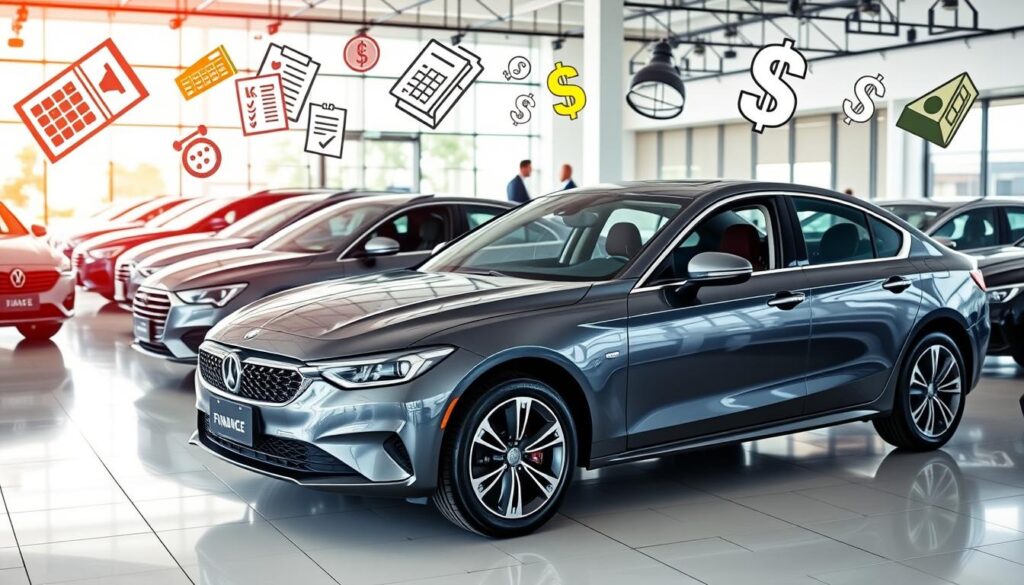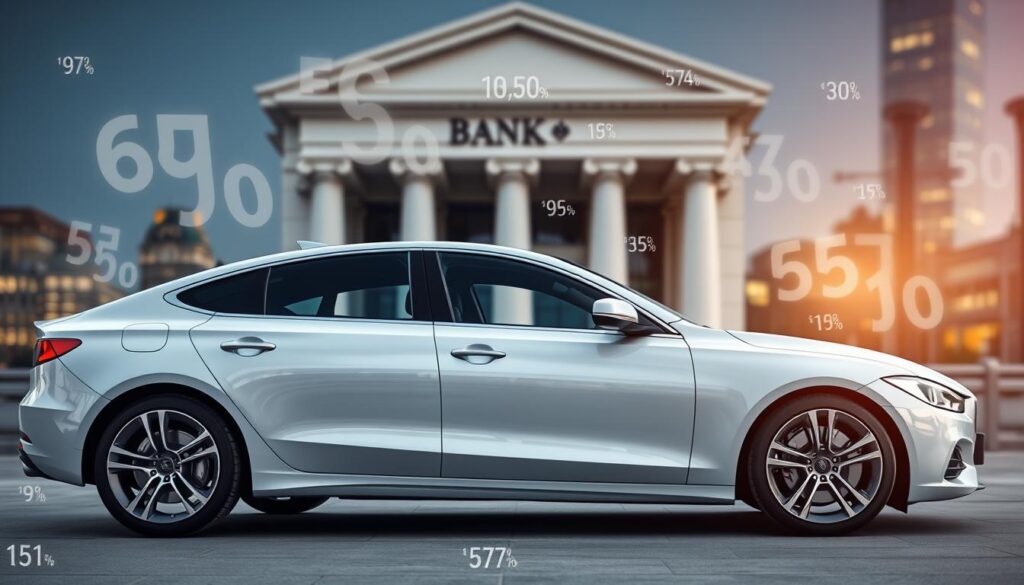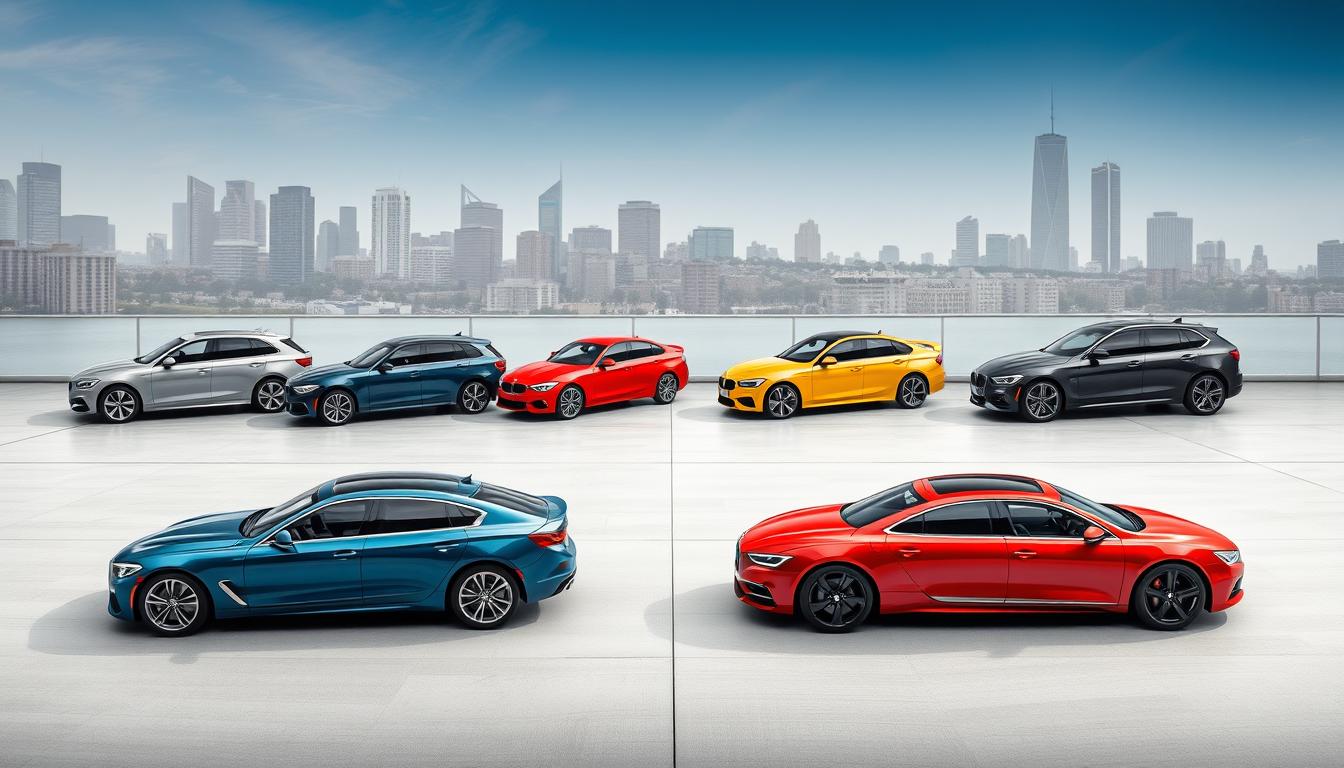Financing a new car can feel overwhelming, even for first-timers. With so many choices, it’s key to have expert advice. This guide will offer tips on financing a new vehicle and car loans to aid in making smart choices. In recent years, 80% to 90% of new cars and more used ones have been bought with finance deals. It’s vital to look into all financing options.
We’ll explore car financing, including budgeting, checking your credit score, and finding the best deal. Our aim is to give you useful tips for financing a new vehicle and car loans. This way, you can get the most out of your purchase.
Key Takeaways
- Understanding your budget is key when financing a new car
- Checking your credit score can help you get better interest rates
- Negotiating the best deal can save you thousands of dollars
- Aiming for a down payment of at least 20% can lower monthly payments
- Exploring different financing options, like credit unions, can offer more flexible terms
- Refinancing a car loan can save borrowers a lot of money
Understand Your Budget Before Shopping
When you’re looking to finance a car, knowing your budget is key. It’s wise to get vehicle financing advice to guide your choices. Start by looking at your current financial health. Think about all the costs of car ownership, like loan payments, insurance, fuel, and repairs.
When figuring out your monthly payments, look at your income, expenses, and savings. Don’t forget about extra costs like registration fees and taxes, which can change a lot by state. Knowing these costs helps you choose the right vehicle financing advice for you.
- Loan payments
- Insurance
- Fuel
- Maintenance and repairs
- Registration fees
- Taxes
By carefully thinking about these costs and getting vehicle financing advice, you can make a smart choice. This ensures you’re getting the most from your financing a car 101 journey.
| Cost | Average Annual Cost |
|---|---|
| Loan payments | $3,000 – $5,000 |
| Insurance | $1,000 – $2,000 |
| Fuel | $1,000 – $2,000 |
| Maintenance and repairs | $500 – $1,000 |
Explore Financing Options Available
When you’re looking to buy a new car, there are many financing options to think about. It’s important to understand these choices to make a smart decision. You can either go for direct lending or dealership financing. Direct lending means borrowing from a bank, finance company, or credit union to pay for the car.
Looking into new car loan options means weighing the good and bad of each. Dealership financing might be easy but could have higher interest rates. Direct lending, on the other hand, might offer better rates and more flexibility. Don’t forget to check out how to finance a new car through credit unions, which might have even better deals.
Dealership Financing vs. Bank Loans
Dealership financing and bank loans are two main choices. Dealership financing is through the dealer, while bank loans come from a bank or finance company. It’s key to look at the terms and conditions of each to see which fits your needs best.
Understanding Credit Unions
Credit unions are also a good option for financing a new car. They often have better rates and terms than banks. It’s smart to compare what different credit unions offer to find the best deal.
Manufacturer Promotions and Incentives
Car makers sometimes offer special deals like low-interest rates or cashback to get you to buy their cars. Keep an eye out for these offers. By looking at all these options, you can make a well-informed choice and find the best new car loan options for you.

| Financing Option | Pros | Cons |
|---|---|---|
| Dealership Financing | Convenience, potentially lower interest rates | Higher interest rates, less flexibility |
| Bank Loans | More flexibility, potentially lower interest rates | Less convenient, stricter eligibility criteria |
| Credit Unions | Competitive interest rates, more flexible terms | Membership requirements, limited availability |
Check Your Credit Score
Checking your credit score is key when looking for vehicle financing. A good score can get you better rates and terms. But, a low score might mean higher rates and less favorable terms. It’s smart to check your credit report often to make sure it’s right.
A score of 690 or higher is usually considered good. But, even with lower scores, you can borrow money. If you’re new to credit, you might not have a score yet. To boost your score, pay bills on time, use credit wisely, and avoid too many credit checks.
Here’s a quick guide on credit scores and what they mean for car loans:
| Credit Score Range | New Car APR | Used Car APR |
|---|---|---|
| 781-850 (Super Prime) | 5.08% | 7.41% |
| 661-780 (Prime) | 6.70% | 9.63% |
| 601-660 (Nonprime) | 9.72% | 14.07% |
| 501-600 (Subprime) | 13.00% | 18.95% |
| 300-500 (Deep Subprime) | 15.43% | 21.55% |

Save for a Down Payment
Saving for a down payment is key when financing a new vehicle. Aim for at least 20% of the price for a new car and 10% for a used one. This can cut down on what you need to finance or lease, saving you money.
A bigger down payment means less interest over time. For instance, on a $47,000 new car, a 20% down payment is $9,400. This can lower your monthly payments by $15 to $18 for every $1,000 saved.
Here are some perks of a larger down payment:
- Reduces the amount you need to finance or lease
- Lowers your total financing or leasing costs
- May result in a lower interest rate
- Can provide a sense of security and stability
Other ways to fund your down payment include trading in or selling an old car. This can give you a lot of money for your new vehicle. Also, setting up automatic savings can help you reach your goals faster by making regular deposits.
| Down Payment Percentage | New Car Price | Down Payment Amount |
|---|---|---|
| 20% | $47,000 | $9,400 |
| 10% | $25,000 | $2,500 |
By exploring these financing strategies and saving for a down payment, you can make a smarter choice when buying a vehicle.
Calculate Total Vehicle Costs
When looking at auto loan tips, it’s key to figure out the total costs of a vehicle. This includes the purchase price, interest rates, insurance, maintenance, and other expenses. A recent study found that a new car buyer with a five-year loan will spend about $12,297 each year. This includes depreciation, loan interest, fuel, insurance, maintenance, and fees.
To understand the total costs better, let’s look at the expenses:
- Purchase price: This is the initial cost of the vehicle, including any upfront payments and sales tax.
- Interest rates: The interest rate on your auto loan can significantly impact your total costs. For example, a $40,000 auto loan with a 6% interest rate over 60 months can result in a total of $5,290.96 in interest paid.
- Insurance and maintenance: These costs can add up quickly, with full coverage auto insurance exceeding $1,000 per year and maintenance costs varying depending on the vehicle.

By considering these factors and following auto loan tips, you can make informed decisions about your vehicle purchase and financing options. Always review and compare different loan offers to find the best deal for your needs.
| Loan Amount | Interest Rate | Loan Term | Total Interest Paid |
|---|---|---|---|
| $40,000 | 6% | 60 months | $5,290.96 |
| $30,000 | 5% | 72 months | $4,787 |
Compare Interest Rates
When you’re looking to finance a new vehicle, it’s key to compare interest rates. Try to get preapproved with several lenders to find the lowest rate you qualify for. Make sure to apply within a two-week window. This way, you can see which lender offers the best deal.
Shopping around is important. It helps you find a car loan with a good interest rate. Even a small difference in rate can save you a lot over time.
Here are some things to think about when comparing rates:
- Loan term: Longer terms might have higher rates, while shorter ones are often lower.
- Down payment: A bigger down payment can get you a better rate.
- Credit score: Good credit scores can lead to lower rates.

By following these car loan tips and comparing rates, you can find the best deal. Always check the loan’s terms and conditions before you decide.
| Loan Term | Interest Rate | Monthly Payment |
|---|---|---|
| 5 years | 4% | $746.38 |
| 8 years | 4% | $494.01 |
Negotiate the Best Deal
When you’re financing a car, getting the best deal is key. We suggest getting vehicle financing advice to get ready. Knowing the total cost, including fees and interest, is important for smart choices.
For financing a car 101, knowing your trade-in’s value is critical. Be ready to leave if the deal isn’t good. Look up the market value of your trade-in and the car you want to buy. This helps you get a better price.
Important things to think about when negotiating include:
- Out-the-door price
- Financing terms
- Trade-in value
Having a preapproved loan can help you get a better interest rate. Always check the financing agreement to understand all the terms and conditions.
By following these tips and being prepared, you can get the best deal on your new car. This makes the financing process smooth.
Consider Leasing vs. Buying
When looking at new car loan options, we often debate leasing versus buying. Leasing lets you drive a new car every few years with lower payments and little upfront cost. For example, subprime borrowers paid $606 on average in Q3 2024, while super prime borrowers paid $594. To learn more about financing a new car, visit our guide on financing a car.
Leasing is great because it lets you drive a new car without the long-term commitment of buying. You only pay for the car’s depreciation during the lease, plus interest. This can mean lower monthly payments than buying a car. But, you need to watch out for mileage limits and possible charges for wear and tear.
- Monthly payments: Leasing often means lower payments, but you won’t own the car at lease end.
- Mileage restrictions: Leases usually limit you to 10,000 to 12,000 miles a year. Going over can cost you.
- Warranty protection: Leases often include warranty coverage during the lease term, covering repairs and maintenance.
The choice between leasing and buying depends on your situation and what you prefer. By understanding the pros and cons of each, you can choose the best option for your needs and budget.
Review the Financing Agreement Carefully
As we wrap up our guide on financing a new car, it’s key to check the financing agreement before signing. Knowing the vehicle financing best practices, important terms, fees, and penalties is vital. This knowledge helps you make a choice that fits your new car financing plans.
Take time to read the contract carefully and ask about unclear terms. Make sure you understand the interest rate, monthly payments, and the loan’s total cost. Also, watch out for penalties for early payoff or missed payments, as they can affect your finances a lot.
Remember, as the borrower, you have rights that protect you from unfair lending. Learn about these rights and ask for clarification or better terms if needed. By carefully reviewing the agreement, you can get the best deal and avoid surprises later.
With these tips, you’re ready for a smooth and enjoyable car buying journey. Happy shopping, and may your new car bring you joy and adventure for many miles!


